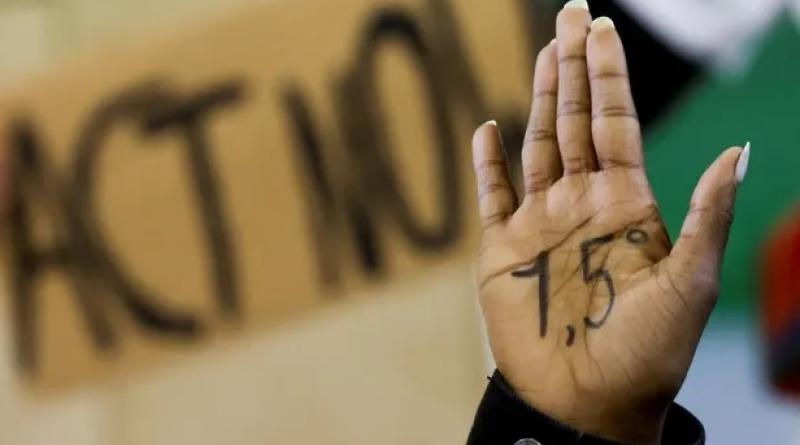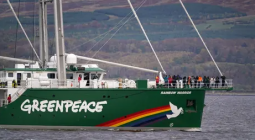Telling people to ‘follow the science’ won’t save the planet. But they will fight for justice

The climate emergency has clear themes with heroes and villains. Describing it this way is how to build a movement
The biggest success of the fossil fuel industry’s decades-long campaign to push doubt about climate science is that it forced the conversation about the climate crisis to centre on science.
It’s not that we didn’t need scientific research into climate change, or that we don’t need plenty more of it. Or even that we don’t need to do a better job of explaining basic science to people, across the board (hello, Covid). But at this moment, “believe science” is too high a bar for something that demands urgent action. Believing science requires understanding it in the first place. In the US, the world’s second biggest carbon polluter, fewer than 40% of the population are college educated and in many states, schools in the public system don’t have climate science on the curriculum. So where should this belief – strong enough to push for large-scale social and behavioural change – be rooted exactly?
People don’t need to know anything at all about climate science to know that a profound injustice has occurred here that needs to be righted. It’s not a scientific story, it’s a story of fairness: people with more power and money than you used information about climate change to shore up their own prospects and told you not to worry about it.
That story is backed up by not only the internal memos of various oil companies, and the discrepancies between those internal communications and what they were telling the public, but also by their patents. In 1973, Exxon secured a patent for an oil tanker that could easily navigate a melting Arctic. In 1974, Texaco was granted a patent for a mobile drilling platform in a melting Arctic. Chevron got a patent for its version of a melting-Arctic-ready drilling platform that same year. Shell was a bit behind; it got its melting-Arctic drilling platform design patented in 1983.
When she was shown this evidence of oil companies’ preparations for a warming world, Lori French was shocked. French’s family fish for crab off the coast of California, and their business has been rocked by warming waters over the past several years. But she and her husband are not big “believers” in climate catastrophe. “We’re kind of both of the opinion that climate change has happened since the beginning of time,” she says.
You might be surprised to learn that she told me this in 2019, shortly after her family and several other crabbers had signed on to support a lawsuit by their trade association against the 30 largest oil companies in the world for their role in delaying action on climate. Not because of science, but because of fairness. They were shown various documents detailing how the fossil fuel industry had been preparing to not just weather climate impacts but continue to profit as the glaciers melted.
“When we saw that information, that was a definite gamechanger,” she told me. “It was like, oh there’s this higher thing controlling the choices you’re allowed to have. And I would like to believe, in my Pollyanna world, that most people are operating on an honest, level playing field. But they don’t.”
For French, it didn’t really matter whether climate change is caused by burning fossil fuels or natural planetary force. She sidestepped the origin story of climate change and instead focused on the injustice inherent in preparing your own business for trouble while telling everyone else not to worry.
Climate change is affecting fisheries all over the world, of course, and displacing entire communities. According to the Intergovernmental Panel on Climate Change (IPCC), climate change is already affecting every region on Earth, in multiple ways, from rising seas to intensifying storms and wildfires. The World Bank predicts more than 200 million people are likely to migrate over the next three decades because of extreme weather events or the disappearance of their homelands. In 2020, 30.7 million people were internally displaced by disasters, over three times more than conflict and violence (9.8 million people). That displacement – like other climate impacts – is hitting communities in the global south first, and will disproportionately affect poor and working-class people all over the world.
Meanwhile, in the same decade during which scientists’ warnings about climate change have grown more dire, social science researchers have discovered that there is almost no correlation between public understanding of climate science and risk perception, and thus little to no relationship between grasping the science of climate change, believing the scientists’ warnings, and doing anything at all about it.
There is a relationship, though, between Americans’ awareness of inequality or injustice and their willingness to support social change. A Norwegian study surveying the impact of various climate stories found that those with heroes and villains had “a large persuasive impact” on readers. A study of students in six countries found that a justice framework spurred young people to act on the climate.
For more evidence that a righteous sense of indignation, rather than a scientific understanding of problems, drives social change, you need only look at history. The US entering the second world war (the war effort people most like to compare with what’s needed to address climate change)? Check. The civil rights, consumer protection, women’s rights, anti-war and gay rights movements? Check again. All driven by moral outrage at the power being wielded by the few over the many.
Climate crisis is not a scientific or technical problem, it is an issue of justice and political will. Acting on it calls into question not just our energy source, but our power structures, catalysing widespread social change. The only thing that’s ever really succeeded in doing that are justice movements – public outcries over blatant injustice and a demand for change. If progressives and climate activists want to have any hope of spurring the kind of movement necessary to shift political and economic interests away from fossil fuels, it’s time to put aside “believe science” and instead embrace a broad fight for justice.
-
Amy Westervelt is a climate journalist and the founder and executive producer of the Critical Frequency podcast network
cover photo: A protest during the Cop26 climate conference in Glasgow, Scotland, 10 November 2021 Photograph: Yves Herman/Reuters





